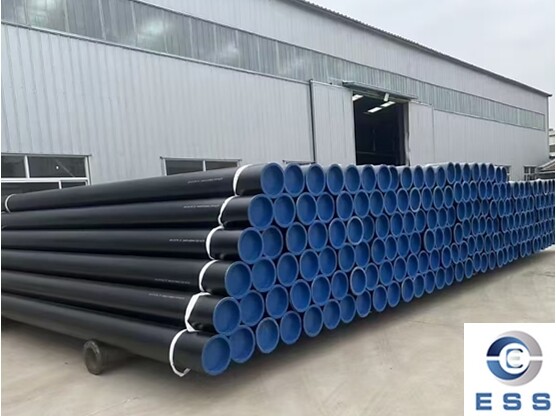
The main difference between seamless and
seam carbon
steel pipes lies in the production process and performance. Seamless
carbon steel pipes have high production costs, but excellent strength and
corrosion resistance, while seam carbon steel pipes have low production costs
but low strength.
Definition of seamless and seam carbon
steel pipes
Carbon steel pipes refer to pipes made of
carbon as the main raw material, and their main components are iron, carbon and
a small amount of silicon, manganese, sulfur, phosphorus, etc. Carbon steel
pipes are divided into seamless and seamed types. Seamless carbon steel pipes
refer to pipes directly processed from steel billets without the need for
welding processes; seam carbon steel pipes refer to pipes formed by bending
steel plates or steel strips into tubular shapes and then welding them during
the production process.
Manufacturing process comparison
Seamless carbon steel pipes have high
production costs, but their performance is excellent and are suitable for high
pressure, high temperature and large diameter occasions. The production process
of seamless carbon steel pipes is to process steel billets into pipes and form
them using cold drawing, hot rolling, cold rolling and other processes.
The production cost of seam carbon steel
pipes is low and they are widely used in some low-pressure and low-temperature
fields. The production process of seam carbon steel pipes is to bend the steel
plate or steel strip first, and then weld the pipe into shape through processes
such as high-frequency resistance welding or spiral welding.
Performance and characteristics comparison
1. Seamless carbon steel pipe
The surface of seamless carbon steel pipe
is smooth and without welds, so it has excellent durability under high
pressure, high temperature and corrosive environment.
It has high tensile strength and light
weight, which is suitable for occasions with high requirements on material
performance.
It will also be heat treated during the
production process to make its internal grains finer, thereby improving its
strength and plasticity.
2. Seam carbon steel pipe
The inner wall of the weld of the seam
carbon steel pipe generally has weld ribs, the manufacturing process is simple,
the cost is relatively low, and it is widely used in low-pressure
transportation and machinery manufacturing.
Because welding is required during the
production process, the strength of the weld is relatively weak, and the
pressure resistance and corrosion resistance are also relatively weak, which is
prone to cracks, corrosion and other problems.
In addition, seamless carbon steel pipes
can withstand higher working pressures, usually above 7 MPa, while seam carbon
steel pipes are mostly between 1.6 MPa and 7 MPa.
Applicable scenarios comparison
Seamless carbon steel pipes are mainly
suitable for high-pressure, high-temperature and highly corrosive environments
such as petroleum, chemical industry, and aviation due to their superior
performance.
Seam carbon steel pipes are more used in
general industrial fields such as low-pressure transportation, water supply and
drainage, and automobile manufacturing.
Application selection of carbon steel
pipes: seam or seamless?
1. Application environment considerations
When choosing carbon steel pipes, the first
consideration is the application environment. For occasions that need to
withstand high pressure or highly corrosive environments, such as chemical and
petroleum industries, seamless
pipes are more suitable due to their superior performance. In low-pressure
transmission systems, such as building water supply and drainage or HVAC
systems, seam
pipes are favored because of their low cost, easy processing and
maintenance.
2. Cost and benefit analysis
Cost is another important consideration.
Due to the complex manufacturing process, the cost of seamless carbon steel
pipes is usually higher than that of seam carbon steel pipes. Therefore, the
choice needs to be weighed against the project budget and long-term operating
benefits. For projects with limited budgets and less demanding performance
requirements, seam carbon steel pipes may be a cost-effective choice.
3. Convenience of supply and installation
In some areas, specific types of pipes
(such as seam pipes or seamless pipes) may be easier to obtain. In addition,
considering the convenience during installation and the requirements for
workers' skills, seam carbon steel pipes are generally easier to install.
However, for occasions that require special installation processes or high
precision requirements, seamless carbon steel pipes may be more suitable.
Summary
Carbon steel pipes are divided into two
types: seam pipes and seamless pipes. The difference between them lies in the
production process and performance. Seam carbon steel pipes have low production
costs, but low strength, and are suitable for low-pressure and low-temperature
occasions; while seamless carbon steel pipes have high production costs, but
excellent strength and corrosion resistance, and are suitable for high-pressure,
high-temperature, and large-diameter occasions. There are also differences in
the application field. Seam carbon steel pipes are widely used in pipeline
transportation systems such as oil, natural gas, and water, while seamless
carbon steel pipes are suitable for petrochemical, aerospace, nuclear industry
and other fields.













 Eastern Steel Manufacturing Co.,Ltd not only improve product production and sales services, but also provide additional value-added services. As long as you need, we can complete your specific needs together.
Eastern Steel Manufacturing Co.,Ltd not only improve product production and sales services, but also provide additional value-added services. As long as you need, we can complete your specific needs together.










